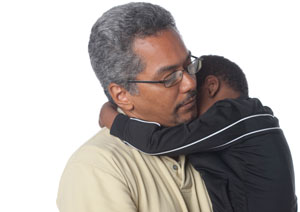Child Concepts of Death
By: Rochelle Perper, Ph.D. | March 20, 2013

The loss of a loved through death one can be an extraordinarily difficult time for everyone in the family. For children, this can also be a time of confusion and fear. Depending on a child’s age, he or she may not fully understand the concept of death and not yet realize that death is permanent.
In order to help children cope with the death of a loved one, it is important to learn how they understand death. A child’s concept of death is based on his or her physical, cognitive, and emotional development. In addition, a child is influenced by what he or she has learned at school or within the family system, cultural and religious beliefs, and previous experiences with death. Below are guidelines offered to help you talk to your child about death and the impact it has on him or her.
Infancy
Infant children will not have any understanding or comprehension of death but will react to parent’s emotions. What is likely to help at this age is keeping the baby’s routine as consistent as possible.
Preschoolers
Preschool-age children are likely to fear separation, but think that death is temporary. During a child’s play they may pretend that some living thing has died and then is brought back to life again. When describing death to a preschooler, it is helpful to tell the child that death means that the body stops working and won’t start working again. Children at this age may also be alarmed by the grief reaction of those around them. You may choose to say something like “mommy and daddy are very sad right now because we miss (the loved one’s name), but we are going to be okay.”
4 to 6 years old
Children at this age may wonder why people have to die. They still have a hard time understanding that death is permanent and may develop some wrong ideas. For example, they may think their angry thoughts or jealous feelings could have caused the person to die. In the child’s magical world, wishes and desires can make things happen. A child at this age is likely to benefit from reassurance that they did nothing to cause the death.
6 to 9 years old
At this age, children may still think that the person who died can come back, but they are beginning to understand that death is final. If they believe in heaven and life after death, they may wonder why they can’t go there and visit. At this age parents or caregivers can expect many different types of questions about life and death. It may be helpful for adults to develop rehearsed responses to repeated questions such as, “Why did (the loved one’s name) have to die?” Rehearsing answers in advance may help ease the emotional shock of such questions.
9 through 11 years old
Children at this age may begin to understand that death is final and inevitable. As a result, he or she may show interest in the biological aspects of death and details of funeral. Again, having rehearsed answers to difficult questions such as, “What happens to (the loved one’s name) body after they die?” will be helpful.
Adolescence
By about 12 years old, children can understand death as well as an adult, but they are preoccupied with the present, with their relationships with their peers, and with their own identity. It is not uncommon for teenagers to avoid talking about the loved one who died. They may express themselves nonverbally through music, journaling, or in their physical appearance.
For more information on children’sgrief responses and how to support a child through grief, please refer to Understanding Child Grief.



